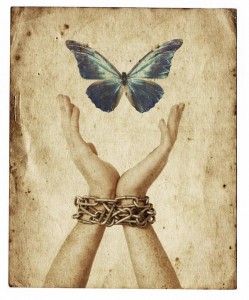The recent overthrowing of the authoritarian governments from the Middle East countries has brought up again the importance of freedom as an essential human value. The notion of freedom however is not as easy to define as one would think. In general we understand that freedom means the capacity to act without any outside restraint. As J. Rufus Fears‚ professor of Classics and chair in History of Liberty at the University of Oklahoma‚ asserts‚ this concept can be applied to a nation for example that is free from any outside domination‚ can be applied to a political system‚ meaning that one can elect its own choice of government‚ but most importantly can be applied to the individual that is free to live by any values as long as it does not harm others.
system‚ meaning that one can elect its own choice of government‚ but most importantly can be applied to the individual that is free to live by any values as long as it does not harm others.
These three levels of liberty May not coexist at the same time‚ some May have political liberty but be subject to a greater multi-national power‚ others May have national freedom but have their individual liberties restricted and so on. In America we are blessed with all three‚ we live in an independent nation‚ we thrive in political democracy and we also enjoy individual freedom to live our lives as we please.
Unlike in the Middle East for instance‚ where individual freedom is severely restricted‚ for us liberty is such a commonplace concept that many times it is perverted into a straightforward libertarian attitude: I can do whatever I want‚ whenever I want‚ with whomever I want. Any attempt to fall back to any type of morality system is seen today by more and more people as retrograde and severely limiting the capacity of expression of the individual. Therefore even in a Church context the necessity to consistently abide to a guiding principle of morality makes many people uncomfortable.
The root of this anxiety May lie within the cultural acceptance of morality through the prism of Western theology that defines sin in very legalistic terms. Sin is a breaking of the divine law‚ consequently alienating the sinner from a God offended by the lack of obedience. This type of morality is but a code of law that man is obligated to follow or severe consequences will dawn upon him. The capacity of man to act as a free agent is severely restricted‚ as he has no choice but to obey for fear of punishment. How does this line up however with the concept of free will that was gifted to man from his creation? Does free will actually mean “obey or else”?
The Fathers of the Church have a different approach to the concepts of sin and free will. In their understanding every man was created with free will and with a distinctive existence‚ but not created to live independently‚ following one’s individualistic goals‚ but to live in communion with God and his fellow men. This is the mystery of the person. A person cannot be defined in isolation‚ but only in communion with others‚ following the model of the three persons of the Trinity.
Communion with God however means also that man’s will should be aligned with God’s will in a perfect synergy leading to eternal union with Him. But this existential necessity does not in any way restrict the freedom of man‚ he is not coerced into an arranged marriage with God‚ but is called to choose this relationship out of free will. By accepting this reality man acknowledges in fact that his existence is relational‚ and that his purpose as a person is only fulfilled by being together with God. Man has the free will to ignore this reality‚ of course‚ but bearing the existential repercussions of the renunciation of the very purpose of his being.
Love is what ultimately explains everything. God loves man and awaits that man would freely love Him back‚ does not force man to love him‚ otherwise this could not be called love. Sin therefore is not just a dry breaking of a law externally imposed‚ but is in fact a rebellion against what we actually are‚ a deliberate rejection of the purpose of our creation‚ a critical existential failure. Abiding to morality‚ is not blindly obeying a set of laws that are arbitrarily enforced to mankind; morality is the deep realization of who we are and what is the very goal of our existence.
The result of the rigidity of Western theological thought is the current indiscriminative rejection of morality all together. A recent study among the youth revealed that they are unwilling to follow any type of morality‚ Christian or not‚ and their decision-making process is guided mostly by the ephemeral emotional impulses of the moment. Their rejection of morality lies in a fundamental misunderstanding of their own existence that in the contemporary secular context has been delinked from its divine purpose and constrained within the walls of the material world. Without a higher spiritual purpose life becomes a random event they have to make the best of‚ and freedom means having no rules and boundaries‚ just doing what “feels” right‚ without any outlook to the consequences: in other words an immoral freedom.
From the perspective of the Fathers freedom is to willfully acknowledge who we are and act according to the purpose of our creation‚ not against it. The Church is guiding its members not toward her own ambitions but is trying to help them discover who they are and help them grow into what God meant them to be. To stay within the boundaries of the Christian morality is to have the freedom to be who we actually are‚ unconstrained by the requirements of a perverted society that is trying to say we are somebody else. We are free only in God‚ only when we fulfill our potential as persons‚ when we follow the path of theosis toward union with Him.
The Freedom of Morality and the Imorality of Freedom‚

